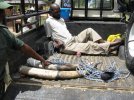interesting....
WE NEED PROSECUTIONS, NOT PUBLICITY STUNTS.
By John M. Sellar Friday, January 3, 2014
Share on email
If what I致e read is correct, the Chinese government will destroy several tons of confiscated elephant ivory next week. Before everyone rushes to commend this action, allow me to question its effectiveness.
In mid-November 2013, the United States government engaged in a massive exercise involving the crushing of over six tons of ivory. I use the term ç²—xercise advisedly, because I imagine some people have still to work out just exactly what this was meant to achieve. Especially as there seem grounds to regard what took place as being little other than a public relations exercise. But if that is what it was, it certainly worked, as the media coverage was really widespread and positive. I bet any destruction in China will get huge attention too, especially as it is currently the most significant final destination for smuggled ivory.
To my mind, some bewildering claims and statements were made in relation to what took place in the US.
For example, 套stockpiles of ivory fuel the demand. Eh? What? How? Are we seriously meant to be believe that ivory traders in Asia, since that is where most of the demand seems to be, have been telling potential customers to save up because, at some hypothetical point in the future, they will get their hands on the stockpiles and finally be able to supply them with the intricate carving they want? Presumably traders didn't mention to prospective customers that one of the stockpiles in question, with over six tons in it, was locked away in the Rocky Mountains of North America? And presumably they didn't add that the chances of it ever appearing on a shelf in China, Thailand or Viet Nam were about as likely as me winning the national lottery this week?
Maybe the US should take its gold bullion stocks and dump them in the ocean somewhere, in case their existence is motivating money-laundering and stock market fraud?
Another fascinating quote was?weæ± e sending a clear message to criminals who engage in trafficking and poaching that the US government takes the issue of illegal ivory trade very seriously. Sorry, but I think the best way for the US government to demonstrate its seriousness on this issue is to lock up in jail, for lengthy periods, anyone who engages in illegal ivory trade within the jurisdiction of its courts. It can also do its utmost to support the rangers, game scouts and wardens in countries in Africa, often desperately-poor countries, to combat the increasingly-sophisticated, organized and violent poaching gangs, some of them with links to terrorist groups, who are bringing many geographical populations of elephants to the brink of extinction. Or, in some cases, past the brink.
As it happens, I am aware that the United States is actively and commendably engaging on both those activities, which makes it all the more bizarre that it should waste its time and effort in questionably pointless gestures.
What I didn't read a US government spokesperson say, although several representatives of conservation bodies claimed this whilst congratulating the destruction decision, is that destroying ivory stockpiles deters poachers and smugglers. Just where does the evidence come from to justify that opinion? I imagine that, just about every week of the year, law enforcement agencies around the globe are incinerating (or by some other means destroying) quantities of cannabis, heroin, cocaine, amphetamines and other forms of narcotics that Customs and Police have intercepted and seized from smugglers and dealers. Has one less drug deal taken place or one fewer narcotic mule been dissuaded from boarding an aircraft with substances in his suitcase? Of course not. And I think it is ludicrous to suggest that they might have.
History shows us that criminals who have their contraband seized go and replace it with more and start the smuggling and illicit trading all over again. And if they see other criminals smuggled goods going up in smoke, they rub their hands in glee because it leaves all the more profit for them.
There's been lots of talk recently about why there has been a massive upsurge in the poaching of elephants in Africa over the past few years. The reasons are probably many and varied. But there's one obvious explanation, for part of the increase, that I have not heard expressed. In 2011, Customs agencies in Asia seized over 26 tonnes of ivory as it was being smuggled from Africa. Similarly large seizures continued through 2012 and 2013. It doesn't take a rocket scientist to work out that organized crime will be hell-bent to replace their losses and will be encouraging poachers to get out into the savannahs and forests to slaughter more elephants.
The US isn't alone in destroying ivory. The Philippines has destroyed ivory stocks. That is one move I would not question. But only because its border control agencies appear to suffer from major corruption issues and there is a history of confiscated ivory disappearing from government stores there.
If you cannot guarantee to keep safe contraband that you seize then, yes, please destroy it as quickly as possible the following day if need be. Presumably this was not an issue facing the United States, since the store in Colorado appeared to have been leak-proof over the past 25 years?
I also read about Kenya destroying ivory stockpiles. This is a more interesting scenario. Yes, the Kenyans have destroyed ivory but, on the last occasion they did so, it apparently wasn't actually å¥heir ivory. It was ivory that had been confiscated in Asia and which had been sent to Kenya as it is the base of an African multi-national wildlife law enforcement task force. Kenya happily destroyed other countries elephant tusks but it has been many years since it set fire to its own stockpiles. I知 not suggesting that anything improper has occurred but it does make one wonder what is going on and why Kenya's own stocks have not been placed on a bonfire recently.
One shouldn't laugh when discussing such serious issues as poaching and illegal trade but I really could not help but smile when I saw one media report that appeared to have been generated by the company who manufacture or sell the crushing gear used to grind down the US stockpiles. One almost had to admire them for exploiting the coverage to promote and publicise the efficacy of their machinery.
I acknowledge that securely storing high-value confiscated contraband, be that drugs or ivory, is costly and that, in and of itself, may be sufficient justification for destruction. But if that is your real reason, say so; do not make silly claims about other benefits. And just go ahead and get rid of the stuff, without engaging in expensive stunts.
In the mid-2000s, China promised the world it would implement a comprehensive and rigidly-enforced internal ivory trade control system. There seem reasonable grounds to question whether China, if not exactly having broken that promise, has done sufficient to fulfil it. Perhaps China could find better ways to demonstrate its commitment to combating wildlife crime than following other nations down a publicity trail that actually may not lead anywhere?
My previous postings ought to have made clear my thinking that actions speak louder than words and that the time for words is long gone. But elephants, tigers, and rhinos, among other endangered species, need our actions to be urgent, decisive and meaningful. Tokens and gestures, however well-intentioned, probably don't contribute a great deal. What is worse, they probably use up time and money that could be better-spent.
----------------------------------------------------------------------------------------------------------------------------------
John M. Sellar OBE was an officer in the Scottish Police Service from 1973 until 1997, during which period he served as a detective (investigating murders, rapes and human rights abuse cases) and ultimately was officer-in-charge of an area where royal security played a major part of his remit. He then moved to the United Nations and, until 2011, was Chief of Enforcement for the Convention on International Trade in Endangered Species (CITES), where he assisted countries in combating wildlife crime. Now retired, he undertakes work as an Anti-Smuggling, Fraud and Organized Crime consultant.









 had lm5 in zambia for a short time. i wish i had kept it the way the poachers are visiting :heh:
had lm5 in zambia for a short time. i wish i had kept it the way the poachers are visiting :heh: ]
]
